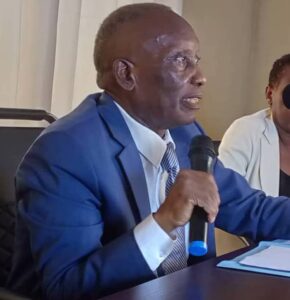Unemployment, ethno-religious cum political issues bane to national security, development- Lt. Col. Ozemhoya

The Commanding Officer, 19 Batallion, Nigerian Army, Lt. Col. Anthony Ozemhoya flanked by the Oloraja of Koko, Cheif Victor Nana (left) and Chairman, Warri North Local Government Area, Mr. Francis Maku during the Independence Day Change of Guard parade at Koko.
Okpalaume Mary, Sapele
The Commanding Officer of the19 battalion, Nigerian Army, Lt.. Col. Anthony Ozemhoya has identified unemployment, ethno-religious cum political crisis, and poor governance as the underlying factors to the problem of national security and development in Nigeria.
He enlisted these factors during a lecture presentation at the 2016 National Day Symposium organized Thursday September 29, by the Nigerian Army in Koko, Warri North Local Government Area of Delta State.
Lt. Col. Ozemhoya delivering the lecture, Security: A Panacea To Sustainable Development, argued that if not dealt with, the lingering and ever increasing national challenges of unemployment, poverty, ethno-religious and political crises, uneven distribution of resources, corruption and poor governance will hitherto threaten the relative peace and security bedeviling the country adding that security of the citizenry is inimical to national development. He emphasized that safety of the citizenry will maximize its potentials in utilizing the nation’s resources adequately for bringing the needed economic development and growth.
According to him, “Nigeria is one of the nations of the world whose political landscape has been inundated with recurring complex conflicts ranging from resource, communal, to political and ethno-religious conflicts. The implication of all these setbacks is poor implementation of policies, rising unemployment, hardship economic and political stagnation that gives rise to the present threatening insecurity which seems to be developing beyond the capacity of state”
“Unemployment has a severe negative implication on national developement in Nigeria as most of its productive force is unemployed. What this means theoretically is that poverty and unemployment increase the number of people who are prepared to kill or be killed for a given course at token benefit. It could predispose one to engaging in illicit activities that would undermine security of the environment,” he stated.
While noting that Nigeria’s multi ethnicity and multi religious facets have always posed as a challenge in Nigeria, he however attributed poor governance as the root cause of ethnic religious and political crises.
“The inability of Nigerian leaders to tackle development challenges, distribute state resources equitably and render good services to the people appears to be one of the causes of ethno-religious violence. It could therefore be argued that a major cause of what we now see as ethnic conflicts in Nigeria have to do with the accusation and allegations of neglect, oppression, domination, exploitation, victimization, discrimination, marginalization, nepotism and bigotry.”
Lt. Col. Ozemhoya therefore advocated for the need of dialogue and good governance as a major tool to finding lasting solution to security lapses in Nigeria.
“There is need for government and stakeholders to explore alternative avenues, basically dialogue, rather than force to finding lasting solution to the security lapses and the menace of insurgency if actually Nigeria wants to develop. This is because the force approach appears to have been inflaming the crisis and diverting attention from the fundamental issues that nurtures and propels the insurgence. Doing these demands that government should retrace their steps to deliver dividend of democracy in lieu of the present elitist centered distribution of state resources.”
The 2016 National Day celebration was climax with the change of guard parade by the 19 battalion, Nigeria army at its headquarters in Koko.



